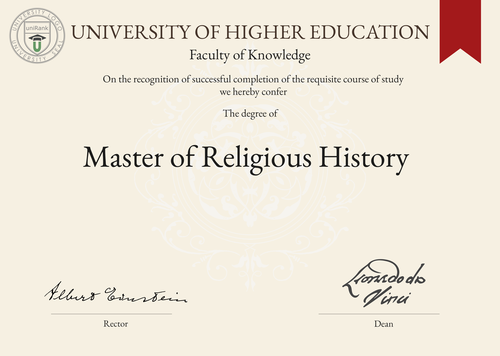
Master of Religious History (M.R.H.)
Guide to Master of Religious History Program/Course/Degree
Master of Religious History (M.R.H.)

Program Name
Master of Religious HistoryProgram or Degree abbreviation
M.R.H.Duration range
The duration of the Master of Religious History program typically ranges from 1 to 2 years, depending on the university and country.Tuition range
Tuition fees for the Master of Religious History program can vary significantly depending on the chosen country and university. It is recommended to check with specific institutions for accurate information.Overview
The Master of Religious History program offers students a comprehensive understanding of the historical development, cultural impact and significance of various religious traditions. Through in-depth study and research, students gain insights into the origins, evolution and practices of different religions, as well as their influence on societies and civilizations.Curriculum Overview by year
The curriculum of the Master of Religious History program is designed to provide students with a broad knowledge base and specialized expertise in the field. The following is a general overview of the curriculum structure: Year 1: - Introduction to Religious History - Comparative Religion - Historical Methodology - Religious Texts and Interpretation - Elective Courses Year 2: - Advanced Topics in Religious History - Research Methods in Religious Studies - Thesis or Research Project - Elective CoursesKey Components
Key components of the Master of Religious History program include: - Study of major religious traditions and their historical contexts - Analysis of religious texts, doctrines and rituals - Exploration of the social, cultural and political impact of religions - Research and critical analysis of religious history - Development of strong analytical and research skillsCareer Prospects
Graduates of the Master of Religious History program can pursue various career paths, including: - Academic research and teaching in religious studies - Museum and cultural heritage work - Journalism and media - Interfaith dialogue and community outreach - Non-profit and humanitarian organizations - Government and policy-making rolesSalary Expectations
Salary expectations for individuals with a Master of Religious History degree can vary depending on factors such as job position, location and years of experience. It is advisable to research specific career paths and industries for accurate salary information. For a more accurate understanding of salary expectations, you can utilize the Job Sites Search Engine, from our sister site jobRank, which searches over 4,600 job sites worldwide. Make sure to specify not only the job title but also the country you are interested in.Conclusions:
The Master of Religious History program offers a comprehensive study of religious traditions, their historical development and cultural significance. It equips students with valuable knowledge and skills for various career paths. However, it is important to note that program duration, tuition fees, curriculum, key components, career prospects and salary expectations can vary depending on the chosen country and university. Visitors interested in pursuing this degree are encouraged to use the uniRank World Universities Search Engine to find institutions offering the Master of Religious History program worldwide.World Universities Search Engine
search for Master of Religious History (M.R.H.) and add the Location (country, state etc.) or specific University you are interested in studying at.
Query examples:
- Master of Religious History (M.R.H.) United States
- Master of Religious History (M.R.H.) United Kingdom online
- Master of Religious History (M.R.H.) Australia international students
- Master of Religious History (M.R.H.) University of California
- Master of Religious History (M.R.H.) University of London tuition fees
- Master of Religious History (M.R.H.) University of Sydney scholarships
Share Program/Course
Interesting? Share this program/course/degree info with your friends now.